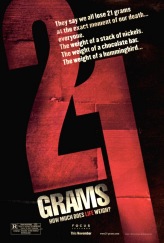| 21 Grams |
| |
 |
USA, 2003. Rated R. 125 minutes.
Cast:
Sean Penn, Benicio del Toro, Naomi Watts, Charlotte Gainsbourg, Melissa
Leo, Clea DuVall, Danny Huston
Writer: Guillermo Arriaga
Original Music: Gustavo Santaolalla
Cinematography: Rodrigo Prieto
Producers: Alejandro González Iñárritu, Robert Salerno
Director: Alejandro González Iñárritu
LINKS
|
 n
Amores Perros, writer Guillermo Arriaga and director Alejandro González
Iñárritu examined three lives brought together by a horrible automobile accident,
with each life accounting for a distinct third of the film. In 21 Grams,
Arriaga and Iñárritu again examine three lives brought together by a horrible
automobile accident. The difference, other than the fact that 21 Grams
is an English-language film, is that now the characters are not merely connected
by the accident as they were in Amores Perros. All three are part of
the same story, inextricably bound together in suffocating bondage.
n
Amores Perros, writer Guillermo Arriaga and director Alejandro González
Iñárritu examined three lives brought together by a horrible automobile accident,
with each life accounting for a distinct third of the film. In 21 Grams,
Arriaga and Iñárritu again examine three lives brought together by a horrible
automobile accident. The difference, other than the fact that 21 Grams
is an English-language film, is that now the characters are not merely connected
by the accident as they were in Amores Perros. All three are part of
the same story, inextricably bound together in suffocating bondage.
In 21 Grams, Arriaga and Iñárritu interweave the different strands
of their story (the three lives) out of sequence, in a spiral around the story's
lynchpin, the automobile accident. Presented chronologically, the story is fairly
simple: Cristina Peck (Naomi Watts) is happily married until her husband, Michael, and
two daughters are run over by an ex-convict turned born-again Christian, Jack
Jordan (Benicio del Toro). He flees the scene. Michael's heart is transplanted
into Paul Rivers (Sean Penn), who after discovering the identity of his unwitting
benefactor, turns away from his wife Mary (Charlotte Gainsbourg) and becomes
obsessed with Cristina. Meanwhile Jack finds himself unable to reconcile what
has happened to his new-found faith.

Sean Penn and Naomi Watts entangled in 21 Grams |
The story may be relatively simple, but the characters are not. As events escalate,
you know that all three will succumb under the burden of grief and remorse unless
something—or someone—relieves them of their heavy load. The title
of the film, which refers to the inexplicable weight loss that supposedly occurs
at the precise moment of death, might be a metaphor for that burden. Could those
twenty-one grams represent the weight of our life force? For better or worse,
Paul, Jack, and Cristina live fully in the moment, in the present tense, investing
their choices with their vitality, setting in motion events beyond their control.
Though the film is in many ways depressing, it is partly about the power of
life as well as death—the ability people have to choose how they will live,
no matter how hopeless circumstances may seem.
The non-linear narrative proves not to be an arthouse gimmick designed to disguise
a lack of substance. There is an organizing principle at work. The story segments,
which are often very brief, are ordered along an emotional arc rather than a
chronological one. The happier, sunnier scenes occur before we even know about
the accident, at the beginning of the film, which then turns darker (often literally),
bleaker, and more frenetic. Like in The Limey,
our inability to place most of the events along a timeline adds an element of
suspenseful intrigue. We can only place ourselves in the hands of the filmmakers
and trust that all the pieces will eventually fit together. Through it all,
Paul's meditations from a hospital bed provide a loose linking thread.
The actors are magnificent. They unequivocally know who their characters are,
inhabiting them so completely that you cease to remember that these are actually
actors, even stars. Penn is more restrained than usual, but equally effective
in understatement as he is in showier moments, while del Toro's face is a map
of his character's tortured soul. Watts takes a wrong step late in the film
(she's Acting! just a little) when Cristina discovers the full truth about Paul,
and Iñárritu's decision to partly obscure her by placing the camera behind Paul
seems to implicitly recognize that Watt's interpretation is not quite right.
However, her amazingly believable breakdown in the hospital in the wake of the
car accident—the finest moment of her promising young career so far—more
than compensates.
The only criticism that can be levelled at the film is that Iñárritu is guilty
of over-directing it. Ironically, the choice to organize the film emotionally
rather than chronologically has a slightly distancing effect. 21 Grams
is an overly cerebral film, requiring you to think too much about what exactly
is going on rather than allowing you to connect with the characters on a gut
level—despite the gut-wrenching performances of the actors. Rodrigo Prieto's
hand-held camerawork and grainy film stock accurately reflects the film's emotional
content, but add to the confusion. For that reason, it doesn't quite pack the
wallop Arriaga and Iñárritu are probably hoping for. Nonetheless, 21 Grams
is an extraordinarily well-crafted film that ranks among the year's best.
Review
© November 2003 by AboutFilm.Com and the author.
Images © 2003 Focus Features. All Rights Reserved.


